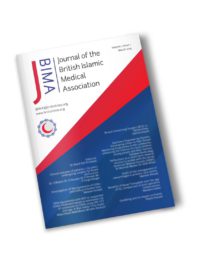
I recently had the opportunity to attend an in-person meeting of the Federation of Islamic Medical Associations (FIMA) Ex-Co in Makkah at the beginning of Ramadan where we marked the 40th anniversary of the organisation’s founding and reflected on the great strides we have made. But the meeting was far more than an exercise in thinking about the past, and the meeting itself got me thinking about the importance of FIMA for the next 40 years – and beyond. I won’t be discussing its history; the President of FIMA Dr Abdul Rashid Abdul Rahman does a great job of this in an article later in the journal.
FIMA is essentially an umbrella group for Muslim medical associations like ourselves and is crucial to the work we do at BIMA. The former brings together more than 50 associations and medical relief organisations across the world in both Muslim and non-Muslim countries, offers an opportunity to share best practice, and ultimately brings us together. FIMA is a fantastic example of the Ummah working as one, and aspiring towards a bigger goal. The geographic diversity of FIMA affiliates is a joy to behold; from Malaysia and Indonesia in the east to Canada and the US in the west and from the UK in the north and South Africa in the south, it is great to see.
Muslim healthcare professionals all face their own unique challenges, but there are of course many issues we face in common too. There is strength in unity and the past two years of the pandemic have shown that. For FIMA to grow however, there are a number of areas we collectively have to work on. And whilst medical associations do a lot of great work on relief and supporting Muslims in need, it is not enough. More should be done by affiliated organisations – including ourselves – on a whole host of issues. Prime amongst them is medical personal development. All doctors undergo rigorous academic study and vocational training, but there is more that can be done in educating medical students and junior doctors on Islamic medical ethics.
This is a topic that many young Muslim doctors are not as knowledgeable about.
Moreover, associations need to push for better education of the history of Islamic medicine. If we as Muslims don’t properly understand and appreciate our predecessors’ contributions, how can we expect others to understand? And how can we strive to repeat their achievements if we don’t know what they are?
It must be noted that as great as the geographic diversity of FIMA is, there is still so much work to do in expanding the organisation and including other Muslim associations within it too. Roughly a quarter of the world’s countries have a Muslim medical association that is part of FIMA so there is a long way to go yet. A challenge is including associations where English is not widely spoken. Language should not be a barrier to participation and representation and it is up to us to think creatively about a solution statement and goals that for this. It is our mission bring us together, not our method of communication. Western Europe and North Africa for example have many Muslim medical groups that would richly contribute to FIMA and would bring it great benefit.
And as we reflect on the end of holy month of Ramadan, we pray that our good deeds are accepted and we consider our achievements over the past year. And whilst this Ramadan has thankfully been a better experience for us all than the previous two in lockdown, “normality” is still elusive. Covid is still a problem and it’s imperative that we take precautions.
I pray that Allah accepts all our good deeds in Ramadan and I wish everyone Eid Mubarak.
Wassalamo Alaikom
Dr Sharif Kaf Al-Ghazal

